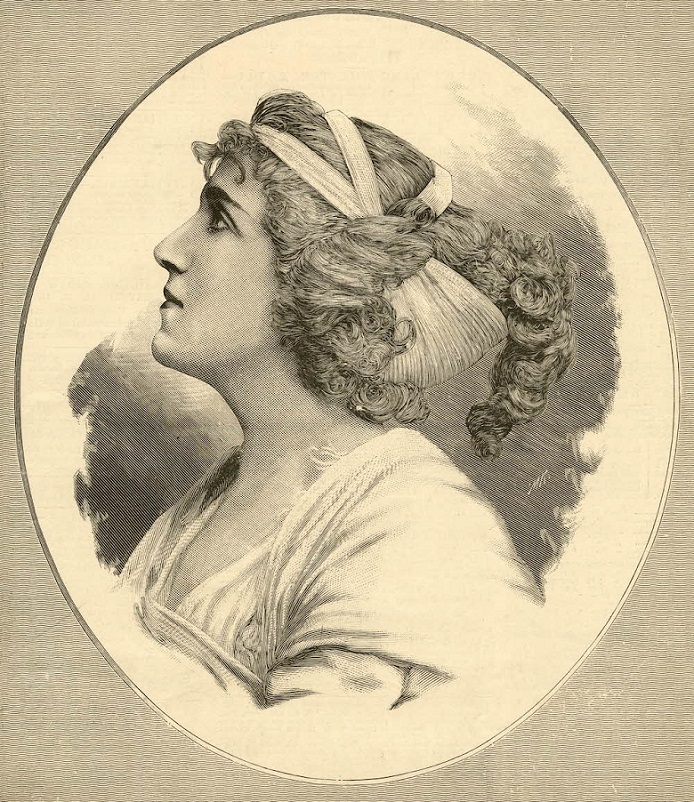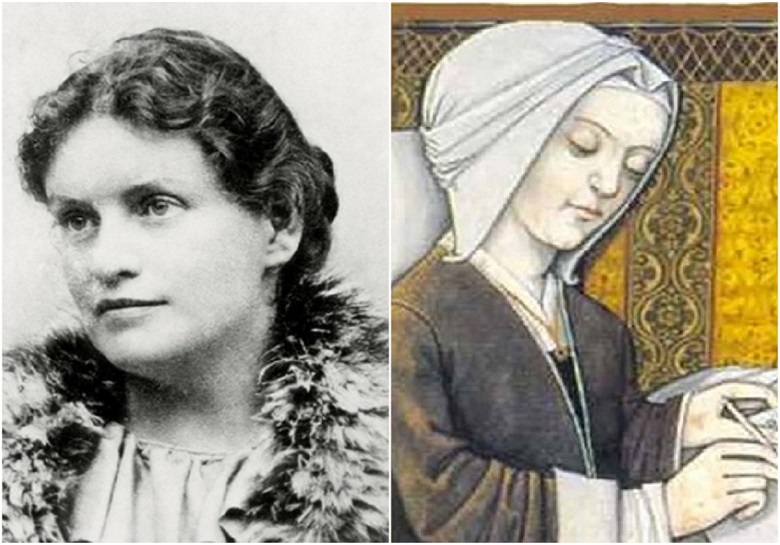There is an old anecdote: “There are two sailings along the river, a man and a woman. The man smokes, and the woman row. Suddenly the man says: “It’s good for you, woman: row yourself and row, but I have to think about life.” This anecdote describes well the centuries-old attitude of philosophers to their occupation and women.
Even though in those days, when it took a lot of grit and a lot of effort to break into science and make a woman talk about her works, women’s names flashed on the horizon of philosophy. Yes, women have always wanted not only to row but also to think about life.
Hypatia of Alexandria

Thanks to the constant references in the writings of ancient philosophers, we know that in Ancient Greece, there were many women philosophers, especially in the school of the Pythagoreans. Thanks to her scientific work and the tragic fate of the most famous of them were Hypatia.
The father of Hypatia was one of the most prominent scholars of his time, Theon of Alexandria. He did not suffer from prejudices regarding women and immediately prepared his daughter for an extraordinary fate. At least he gave her a name that means “supreme.” Theon personally taught his daughter.
At about forty to fifty years (the expected start of such a career), Hypatia lectured at her father’s school under Museion. This very Greek cultural and educational center owned the Library of Alexandria.
Hypatia headed the Department of Philosophy at the school, but her interest was also astronomy and mathematics.
Contemporaries knew Hypatia as the author of the most complex astronomical tables and a follower of the school of Neoplatonism. After her father’s death, the scientist took over his school’s leadership as his leading student. Slava and Hypatia and her educational institution attracted many students, so the school flourished without municipal funding. There were many senior government officials among the alumni. The early Christian philosopher-theologian Bishop Synesius also graduated from it.
“She has acquired such scholarship that she surpassed her contemporary philosophers; was the successor of the Platonic school, descended from Plato, and taught all philosophical sciences to those who wish. Therefore, those wishing to study philosophy flocked to her from all sides. By education, with a good self-confidence, she presented herself with modesty even in the face of rulers; and in that she did not supply any shame that she appeared among men, for her extraordinary humility, everyone respected her and marveled at her, “the historian Socrates Scholastic wrote later.
The death of Hypatia was terrible. She greatly influenced the mayor, and his political opponent, Bishop Cyril, told his flock that Hypatia was bewitching the mayor with pagan spells and influencing his decisions.
The most passionate supporters of Cyril attacked Hypatia and tore her to pieces, not listening to excuses. All works of Hypatia were burned down together with the Alexandria Library. We only have memories of the scientist herself.
Lou Salomé
A native of St. Petersburg, writer, philosopher, a psychoanalyst is famous, among other things, for the influence that she had on Nietzsche, Freud and Rilke. The father of Lou (then still Louise) was a Russian German, General Gustav von Salome. “Lou,” the girl came up with the name of the pastor, with whom she fell in love at the age of seventeen.
In the eighties, European universities were occupied by Russian students – after all, in their homeland, these girls could not get a higher education according to the law. Lou went to study, accompanied by her mother, to Switzerland.
In Europe, Lou is imbued with the spirit of freedom that walks among her compatriots.
She visits salons and travels to different countries with two young people – Paul Ree and Friedrich Nietzsche. Although Lou preached communal life in celibacy, many still suspect that her connection with Paul and Frederick was not only spiritual. Nietzsche introduced Salome to everyone as one of the most brilliant people of their time and later brought her image in his famous “Zarathustra.”
At twenty-five, Lou marries Orientalist professor Friedrich Karl Andreas. Andreas is much older, and Lou only agrees to his proposal after trying to stick a knife in his chest. Nevertheless, she sets a condition for her husband: no intimate relationships.
Salome and Andreas lived together for forty-three years, and by all indications, they did not touch each other. Lou preferred to let younger men into her bed. Andreas also played on the side; his daughter from one of Salome’s mistresses later adopted.
As a psychoanalyst, Salome collaborated with Anna Freud, wrote 139 articles and a book on the philosophy and psychology of erotic attraction. Lou passed away in 1937, and immediately after Salome’s death, the Nazis solemnly burned down her library.
Tullia d’Aragona
Even during his lifetime, the famous Salome was compared with a woman philosopher, also known as the most unusual courtesan of Italy – Tullia d’Aragona. In general, both Tullia’s choice of the path of a courtesan and her popularity in this field seem inexplicable. The girl was the daughter of the cardinal, and his mistress, Giulia Ferraresehe, did not know anything about the refusal from the standards of her time.
Fans, however, enthusiastically praised Tullias’s gentle voice, her ability to maintain the most intelligent conversation, and playing the lute. She received her special education with the support of her father, who early noticed the girl’s incredible intelligence.
Tullia constantly changed her place of residence. Among her lovers were many famous poets, which in itself ensured her place in history. But Tullia became famous for her philosophical studies of the nature of female sexuality and emotionality.
Tullia managed to stand out even in Venice as a courtesan, where about a hundred thousand courtesans lived. In addition, she was noted in a political scandal around certain state secrets in Florence. The famous writer of his time, Girolamo Muzio, dedicated his Treatise on Marriage to her. Muzio also helped publish Tullia’s writings, being an admirer of her sharp thought and literary talent.
Tullia, one of the few courtesans, was eventually given the right to disregard the dress code for courtesans and be officially called a “Poetess” by occupation. Given the prejudice against women and especially those who lead unrighteous lives, this recognition of achievement is worth a lot.
Christine de Pizan
Philosophers of the past very often explained why the world and society are arranged exactly as they are, proceeding from the fact that, in general, everything is fair. Some people (not they) are naturally born to suffer and row on a boat.
It is understandable that when a woman came to philosophy, she, on the contrary, proceeded from the fact that socially arranged unfairly. She argued her views in terms relevant to her time and cultural environment. It is not surprising that many thinkers of the past are considered to be pro-feminists. Among them is one of the very first thinkers protesting against the position of women in society, Christine de Pizan.
Christine’s father, an Italian, was a physician and astrologer at the French king Charles the Wise court. The girl grew up in the palace and had free access to the royal library – unlike almost all other girls in France. At the same time, the Louvre library was the largest in Europe, so Christine was read from childhood by Italian and Roman authors.
At the age of fifteen, however, Christine was treated the same as with illiterate girls – they were married to a much older man. She gave birth to three children from him. After ten years of marriage, Christine was widowed: her husband was killed by the plague. Since by that time, neither the good King Charles nor Christine’s father survived, the young widow found herself in a difficult situation.
She managed to find patrons for herself, Jean Berry and Duke Louis of Orleans. The children were no longer babies, new children were not expected, the patrons gave out at least a tiny but firm boarding house, and Christine took up the business she had dreamed of for a long time: literature.
Over the next nine years, Christine wrote more than three hundred love ballads and poems. They made her quite famous: the poetess was invited to the English court. But Christine rejected the offer and soon left the brilliant Paris to move to a monastery. There, nothing prevented her from reading a lot.
In the end, she went down in history, not as a poet, but as the creator of the “Book of the City of Women,” a philosophical work that substantiates the initial equality of women and men in abilities and talents.
Anne de Stael
Madame de Stael became famous for her confrontation with Napoleon – after a public discussion, he even expelled her from France.
Anne is also one of the most famous historians of the Revolution and opponents of the restoration of the monarchy; she owns works, from which many contemporaries drew ideas about the inevitable regression of literature under authoritarian regimes and her contemporaries – about the need to recognize equal rights for women and men.
These ideas will not seem like something sharp, but they greatly annoyed Napoleon and were among the reasons for his decision to expel Madame de Stael.
As you know, at the very mention of Anne, Napoleon’s face changed. He discussed it only with a personal touch and signed a decree on exile, even distracted himself from topical foreign policy issues.
Anne was the daughter of the finance minister of the last king of the Bourbon dynasty. Her mother kept a literary salon famous throughout Paris; over time, de Stael started the same. Despite the lack of active political activity, in political circles, she enjoyed influence as an ideologist.
Her first philosophical work was a commentary on Spirit of the Law – and she wrote them at the age of fifteen, fantastic adult acquaintances with her ability to formulate thoughts.
At twenty, Anne was married to the Swedish ambassador, Baron Erich Magnus Stael von Holstein. The marriage turned out to be unhappy, which, perhaps, only added to Anne’s philosophical nature.
Despite the fact that her whole family, like Anne herself, suffered from the Great French Revolution, de Stael took the ideas of freedom and equality very close to her heart. After her expulsion shocked half of Europe with her reflections on this topic – she traveled to many countries.
One of de Stael’s most famous novels, Corinne, is about the plight of a genius woman in a society where a woman has no right to be a genius. The same theme is raised in another, more scandalous for contemporaries novel “Dolphin.”
Even though de Stael was described with the words “bad as hell, smart as an angel,” there were enough novels in her life, including with men much younger. The scandalous fame not only did not prevent her from inviting her to receptions in monarchical states but instead increased the number of invitations.
De Stael died of a stroke – she went to an evening with the minister and fell right on the steps of his house. For several months she lay sick and breathed her last breath on the anniversary of her beloved Revolution.
